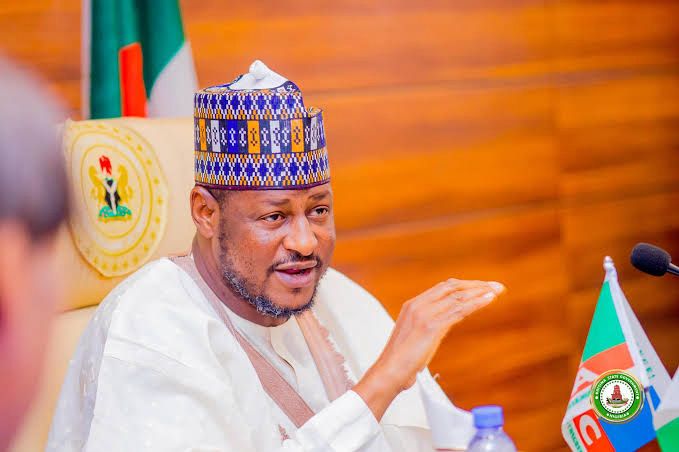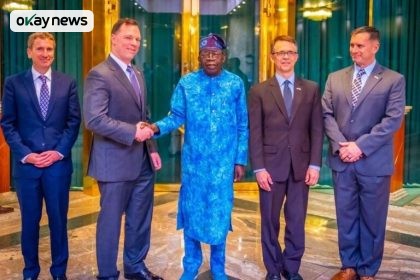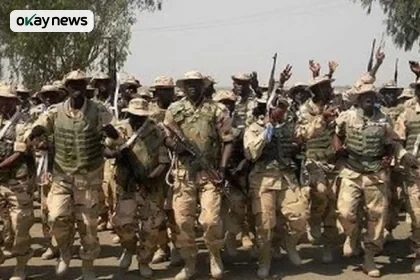Katsina State Governor, Malam Dikko Umar Radda, has firmly denied reports suggesting that his administration is in talks with bandits. He emphasized that the government remains focused on achieving genuine and lasting peace through community-driven security efforts rather than backdoor negotiations.
Governor Radda made this known during the inauguration ceremony of 100 newly trained officers of the Community Watch Corps (C-Watch), held in Katsina. The new batch, which marks the third phase of the training exercise, will be deployed across 20 of the state’s 34 local government areas.
Speaking at the event, Radda said his administration had made remarkable progress in its ongoing efforts to restore peace and normalcy to communities previously plagued by insecurity.
There had been viral reports alleging that some state officials were holding peace talks with bandit leaders in parts of Katsina. However, the governor dismissed the claims as false and misleading.
“The headlines say the Katsina State Government is negotiating with bandits, but that is far from reality. I have publicly maintained that the government will not negotiate with bandits but will always welcome peace,” Radda stated.
According to the governor, his government’s approach to addressing insecurity—popularly known as the Katsina Model—is built around empowering local communities to lead peace initiatives while the government provides support and oversight.
“The role of the state government is to encourage and support the peace process while maintaining law and order in these communities. Our focus is to ensure that communities that enjoy peace also benefit socio-economically, giving our people a dignified existence,” he said.
Okay News reports that Radda highlighted notable achievements recorded under the peace accord initiative, noting that several communities have experienced significant drops in attacks. He cited examples where Jibia had remained peaceful for eight consecutive months, while Batsari had gone seven months without any major security breach.
“Other local government areas — Danmusa, Safana, Faskari, and Sabuwa — have also witnessed relative calm since adopting the initiative,” he added.
Radda explained that the creation of the Community Watch Corps was part of a deliberate plan to strengthen local resistance against banditry and support federal forces operating in the state.
“When we launched the Community Watch Corps over two years ago, we were in uncharted territory. The learning curve was steep, and the uncertainty was high. We were a new administration with the arduous task of bringing peace and security to many parts of the state. The only thing I was certain of was my administration’s determination to bring an end to banditry in Katsina State. I campaigned on it, and the trust of the people was not going to be forsaken,” he said.
The 100 newly trained officers will be deployed across Kankia and Dutsin-Ma local government areas, with 50 officers assigned to each. Dutsin-Ma, a region that borders Safana, Danmusa, and Matazu, is one of the major flashpoints of banditry in the state.
Governor Radda reaffirmed that kinetic military operations remain a vital part of Katsina’s overall security framework.
“This ceremony is proof that the state government will not relent in fighting insecurity and banditry wherever they exist. Those who wish to return to crime will face the full force of the law,” he warned.
He also commended the Nigerian Air Force, Nigerian Army, and Nigeria Police Force for their continued collaboration with the state government. Radda said the synergy between federal security agencies and the state had improved intelligence sharing, quick response, and coordinated operations.
The governor charged the new recruits to perform their duties with professionalism and integrity.
“You are entrusted not only with maintaining security but also with representing the shared goals of a peaceful and prosperous Katsina State. It is essential to uphold integrity, professionalism, and respect for human rights in the discharge of your duties,” he said.
In his remarks, the Commissioner for Internal Security and Home Affairs, Nasir Mu’azu, commended the governor for introducing a locally designed approach to security management.
“No doubt, he saw, he analysed, and he conquered — using a homegrown, community-based approach in which able-bodied young men from their various communities were selected, screened, trained, and deployed to serve as the first line of defence for their mothers, fathers, wives, daughters, sisters, brothers, and friends,” Mu’azu said.
He added that this marked the third phase of the C-Watch training exercise, following similar ones in October 2023 and November 2024.
Also speaking, the Chairman of the Standing Committee on the Katsina State Community Watch Corps, Maj. Gen. Junaidu Bindawa (retd), said the recruits underwent rigorous training covering weapon handling, communication, minor tactics, intelligence gathering, community policing, and the rules of engagement.
“The aim is to produce disciplined, professional, and community-focused operatives,” Bindawa noted.
He, however, urged for better command coordination between local and state headquarters to enhance accountability and effectiveness.
Governor Radda reaffirmed that Katsina State will continue to prioritize safety and development while encouraging communities to take ownership of peacebuilding efforts.







